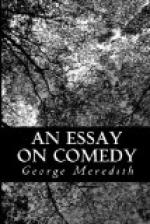‘Ou d’etre homme d’honneur on ait la liberte,’
she is likely to find herself the companion of a starving satirist, like that poor princess who ran away with the waiting-man, and when both were hungry in the forest, was ordered to give him flesh. She is a fieffee coquette, rejoicing in her wit and her attractions, and distinguished by her inclination for Alceste in the midst of her many other lovers; only she finds it hard to cut them off—what woman with a train does not?—and when the exposure of her naughty wit has laid her under their rebuke, she will do the utmost she can: she will give her hand to honesty, but she cannot quite abandon worldliness. She would be unwise if she did.
The fable is thin. Our pungent contrivers of plots would see no indication of life in the outlines. The life of the comedy is in the idea. As with the singing of the sky-lark out of sight, you must love the bird to be attentive to the song, so in this highest flight of the Comic Muse, you must love pure Comedy warmly to understand the Misanthrope: you must be receptive of the idea of Comedy. And to love Comedy you must know the real world, and know men and women well enough not to expect too much of them, though you may still hope for good.
Menander wrote a comedy called Misogynes, said to have been the most celebrated of his works. This misogynist is a married man, according to the fragment surviving, and is a hater of women through hatred of his wife. He generalizes upon them from the example of this lamentable adjunct of his fortunes, and seems to have got the worst of it in the contest with her, which is like the issue in reality, in the polite world. He seems also to have deserved it, which may be as true to the copy. But we are unable to say whether the wife was a good voice of her sex: or how far Menander in this instance raised the idea of woman from the mire it was plunged into by the comic poets, or rather satiric dramatists, of the middle period of Greek Comedy preceding him and the New Comedy, who devoted their wit chiefly to the abuse, and for a diversity, to the eulogy of extra-mural ladies of conspicuous fame. Menander idealized them without purposely elevating. He satirized a certain Thais, and his Thais of the Eunuchus of Terence is neither professionally attractive nor repulsive; his picture of the two Andrians, Chrysis and her sister, is nowhere to be matched for tenderness. But the condition of honest women in his day did not permit of the freedom of action and fencing dialectic of a Celimene, and consequently it is below our mark of pure Comedy.
Sainte-Beuve conjures up the ghost of Menander, saying: For the love of me love Terence. It is through love of Terence that moderns are able to love Menander; and what is preserved of Terence has not apparently given us the best of the friend of Epicurus. [Greek text] the lover taken in horror, and [Greek text] the damsel shorn of her locks, have a promising sound for scenes of jealousy and a too masterful display of lordly authority, leading to regrets, of the kind known to intemperate men who imagined they were fighting with the weaker, as the fragments indicate.




